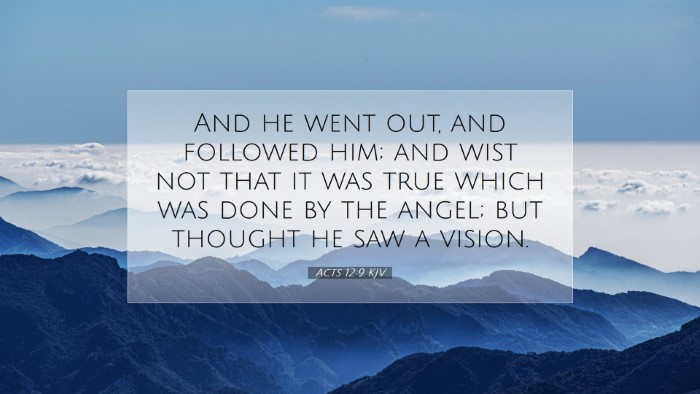Old Testament
Genesis Exodus Leviticus Numbers Deuteronomy Joshua Judges Ruth 1 Samuel 2 Samuel 1 Kings 2 Kings 1 Chronicles 2 Chronicles Ezra Nehemiah Esther Job Psalms Proverbs Ecclesiastes Song of Solomon Isaiah Jeremiah Lamentations Ezekiel Daniel Hosea Joel Amos Obadiah Jonah Micah Nahum Habakkuk Zephaniah Haggai Zechariah MalachiActs 12:9
Acts 12:9 KJV
And he went out, and followed him; and wist not that it was true which was done by the angel; but thought he saw a vision.
Acts 12:9 Bible Commentary
Commentary on Acts 12:9
Verse (Acts 12:9): "So he went out, and followed him; and wist not that it was true which was done by the angel; but thought he saw a vision."
This verse occurs during a pivotal moment in the early church, illustrating themes of divine intervention and the nature of faith. The context involves Peter, who has been imprisoned by King Herod and faces the possibility of execution. The account provides rich material for reflection and interpretation, drawing on historical and theological insights.
Overview of the Passage
Acts 12 narrates the bold activities of the apostles following the ascension of Christ. Peter’s imprisonment marks a significant challenge to the fledgling Christian community, urging leaders and believers to rely on prayer and divine provision. The mention of Peter's subsequent escape, facilitated by an angel, serves as a testament to the power of God over human authorities.
The Nature of Divine Deliverance
Peter’s experience, as depicted in this verse, emphasizes the miraculous nature of his deliverance. Matthew Henry comments on the "wonderful work of God" in saving Peter, noting that it was “an act of remarkable mercy.” The unforeseen intervention of the angel signifies that divine assistance often arrives unexpectedly, reinforcing the idea that God acts outside of human expectations.
Albert Barnes further elaborates on the duality of perception experienced by Peter, highlighting that while he followed the angel, he was uncertain of the reality of the event. This suggests a layering of experience where faith and doubt coexist, presenting a relatable struggle for believers who witness God’s hand yet grapple with skepticism or wonder about the authenticity of miraculous events.
Understanding Peter's State of Mind
Peter’s confusion, as he thinks he is experiencing a vision, offers rich insights into the human condition. Adam Clarke points out that this may reflect the state of Peter’s mind under duress, where surreal experiences can blur the lines of reality. Clarke suggests that such moments of divine encounter are often marked by an element of disbelief, a theme recognized throughout Scripture in encounters with the divine.
- Theological Implications: This duality raises questions pertinent for theologians regarding their understanding of faith and perception. Is doubt an enemy of faith, or can it coexist as a part of the authentic spiritual journey?
- Pastoral Insights: For pastors, this passage underscores the importance of facilitating environments where congregants can express uncertainty while still encountering God’s grace.
Faith Amidst Adversity
The setting of persecution illuminates the theme of steadfastness among early Christians. The prayer of the church for Peter, preceding this verse, indicates the power of communal support in times of trial. Henry notes that the “prayers of the righteous are powerful and effective,” suggesting that collective faith can manifest God’s will in tangible ways.
Believers are encouraged to reflect on how they respond to adversity: Do they see God's hand at work, or do they succumb to despair? This experience of Peter serves as a powerful reminder that God is attentive to the prayers of His people and intervenes in ways that challenge our understanding of reality and the possibilities of deliverance.
Practical Applications for Today
The implications of Acts 12:9 extend beyond the historical narrative, urging modern believers to explore their relationship with faith and divine involvement. Consider the following applications:
- Engagement in Prayer: Like the early church, engage in fervent and communal prayer during challenges, recognizing that prayer matters.
- Openness to the Supernatural: Maintain a posture of openness to God’s miraculous workings, even when they challenge belief or expectation.
- Encouraging Doubt as a Part of Faith: Acknowledge that doubt can be a vital part of faith, creating pathways to deeper understanding and relationship with God.
Conclusion
Acts 12:9 captures a moment of divine rescue intertwined with human fragility. As such, this verse serves as a rich source for theological reflection, encouraging a deeper exploration of faith, prayer, and the reality of God’s intervention in the lives of believers. Whether one is a pastor, a scholar, or a layperson, the lessons from Peter's experience offer profound insights into the nature of faith amidst adversity and the unexpected ways in which God fulfills His promises.


